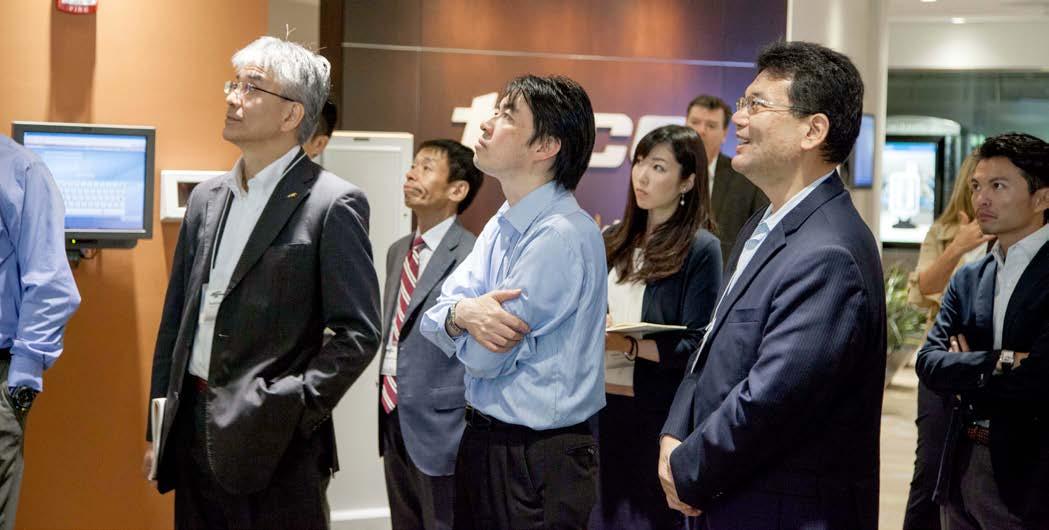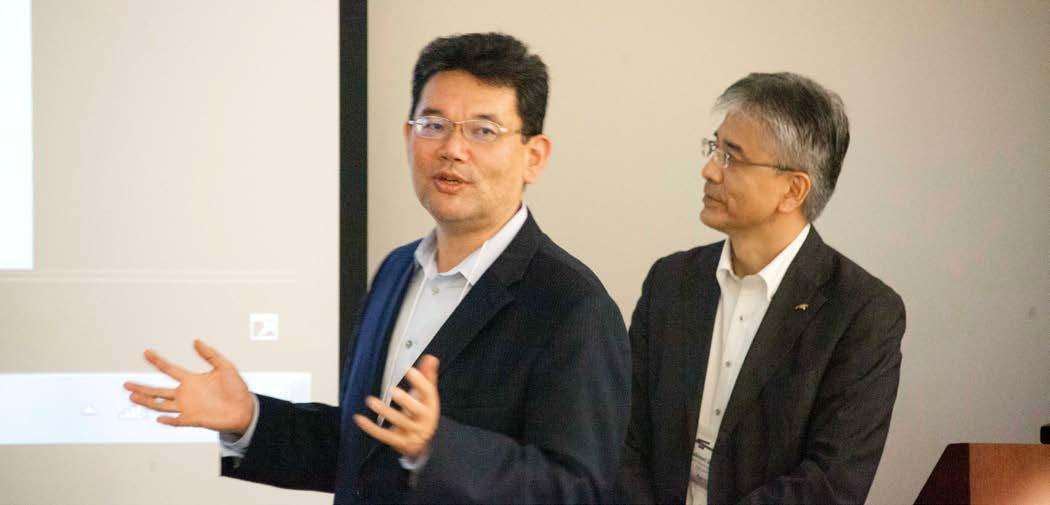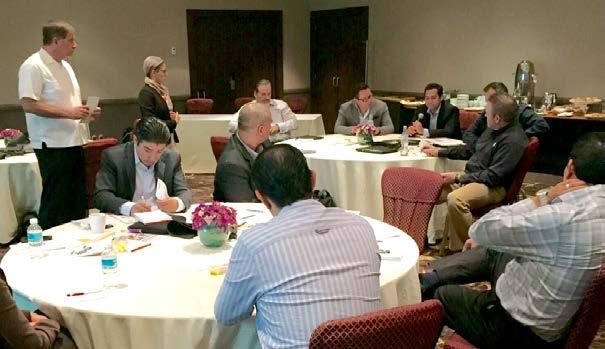
11 minute read
INDUSTRY NEWS
Event Features ORC Subject-Matter Experts from Both the US and Japan
By James Lee, LPC, LP Magazine
Organized retail crime prevention recently took on an international flavor when Tyco Retail Solutions hosted the International Organized Retail Crime Summit 2015 at their Boca Raton, Florida, campus in late October. LP Magazine was there to report on the event, which offered a unique opportunity for retail loss prevention, law enforcement, academia, and technology solution providers from the US and Japan to meet and collaborate face-to-face on the growing concern of organized retail crime (ORC).
Recognizing the impact and magnitude of this global problem, the two-day summit was attended by some of the industry’s top subject-matter experts from both countries. The event featured an open, interactive format where attendees had the opportunity to learn and share information regarding the latest approaches being employed to combat ORC.
Different than traditional forms of shoplifting, organized retail crime encompasses large-scale retail theft and other fraudulent activity primarily involving incidents where stolen goods are converted into cash. Yet even more troubling is the role that ORC plays as a “gateway crime” with incidents increasingly linked to even more serious issues such as violent crimes, drugs and drug trafficking, identity theft, money laundering, cybercrimes, and even financing terror groups. While the global figure is unknown, industry experts estimate the cost of organized retail crime at about $30 to $40 billion annually the US alone.
Market Updates on Organized Retail Crime
Monday’s events began with a US market update on ORC hosted by Paul Jones, LPC. Jones, eBay’s executive director of global asset protection, offered unique insights on ORC challenges facing both brick-and-mortar and online retailers based on his experience in both formats.
ORC once depended largely on black-market operations and physical locations such as flea markets and other illicit brick-and-mortar locations to sell stolen goods. Now, ORC operations are increasingly turning to online marketplaces as an easier, broader reaching, and more profitable way to sell stolen merchandise.
According to Jones, maintaining trust is a key element in the eBay business model. Stolen goods create an unfair and untrustworthy market place for buyers and sellers. He outlined

initiatives within his company for identifying and shutting down resale of stolen merchandise. “To confront the challenges related to organized retail theft and the sale of stolen goods, we all must remain vigilant and leverage an ORC ecosystem of strong strategic partnerships. Our dedicated global teams are focused on enforcing policies, ensuring we have the right technology in place, collaborating with rights owners and working closely with law enforcement to combat ORC,” said Jones.
“The best response to organized retail crime is to implement best-in-class solutions. At the store level, this would include CCTV cameras, analytics, EAS tagging standards, and other tools matched with customer traffic and sales information. These efforts complemented with good customer service offer our best chance at deterring ORC. As it relates to online solutions, it’s critical to know and understand the habits of your customers that shop online as well as you know the customers in your stores; and synchronize and analyze that data,” he emphasized. Every solution requires teamwork, collaboration, and cooperation.
Dave DiSilva with eBay discussed the role that online retailing has taken in combating ORC. DiSilva discussed research and detection methodology, the eBay PROACT team, as well as several examples of the cooperative relationships that eBay has


In 2016, upgrade your program to exercise the laws specifically enacted to protect retailers.

PalmerReiflerLaw.com
ORLANDO | ATLANTA | CHICAGO | DALLAS LOS ANGELES | LONDON | TORONTO Toll-Free in the U.S.: 866.875.6565

developed with retail organizations and law enforcement agencies to successfully support efforts to mitigate organized retail crime.
ORC Issues in Japan
A market update reviewing ORC issues in Japan was also presented by Yoshinori Inamoto with the National Shoplifting Prevention Organization (NSPO), a nonprofit organization comprised of major Japanese retail businesses dedicated to combating organized retail crime and other retail theft issues in Japan.
Many of the ORC issues occurring in Japan that were discussed by Inamoto were very similar to ORC incidents occurring here in the states. Gang activity, booster operations, illicit websites, and online auctions involving stolen goods are just some of the ORC operations currently active and causing significant retail losses in Japan. As these concerns continue to grow, property crimes involving retail theft have climbed steadily across the country with reported shoplifting cases now eclipsing 10 percent of all reported penal code offenses.
Throughout the course of the summit the delegates from Japan gathered insights from US subject matter experts to further support their ongoing efforts to tackle the rising threat of organized retail crime in Japan.
Embracing Technology
Keeping pace with the ongoing changes in retail is a critical aspect of the evolution of the loss prevention industry. This requires a commitment to growth and innovation in all areas of the profession whether it involves learning new skills, accepting new roles and responsibilities, modifying our approach to the business, or exploring new and creative solutions.
With increasing support to fight ORC issues, a growing number of retail companies are allocating additional resources to help fight organized retail crime, with many looking to add or enhance innovative new technology solutions. This ongoing loss prevention industry trend was also addressed as part of the summit and supported by the host of the event.
A behind-the-scenes site tour of the Tyco Retail Experience Center included a closer look at some of the latest in technologies and product enhancements to address ORC issues. The tour showcased tagging solutions, dual-technology detection platform, metal foil and jammer detection sensors, and RFID as EAS solutions. Tyco’s wide range of advanced IP video surveillance solutions include public view monitors (PVMs) and video analytics to help monitor and capture ORC activities, while providing law enforcement evidence for potential prosecution. These solutions enable retailers to be alerted to possible suspicious activities such as a shelf-sweep event or crowd formation, and to receive point-of-sale analytics on potential internal theft. Facial recognition is one of the latest solutions offering retailers the ability to be alerted when possible known offenders come into their stores.
The Power of Collaboration
One of the most powerful sessions of the event involved a “retailer collaboration” presentation by Brendan Dugan with Walgreens and Terrence Mullen with CVS. Featuring a discussion on the importance of cooperative efforts in the battle against organized retail crime, Dugan and Mullen elaborated on joint efforts involving multiple ORC investigations between the retailers that have successfully resolved several multi-million dollar cases. The presentation clearly demonstrated the power of collaboration and the results that can be achieved by working together.
A related discussion on “Active Involvement of Local, State, and Federal Law Enforcement” was shared by Scott Campbell with the Federal Bureau of Investigation and Rich Rossman of the Broward County Sherriff’s Office. This presentation offered highlights on the importance of developing strong partnerships with law enforcement partners and the results that we can reach and build upon when we work together.
The final session of the event was a presentation by Dr. Read Hayes, director of the Loss Prevention Research Council
and research scientist at the University of Florida. Dr. Hayes presented his results on how to identify and prevent ORC by affecting offender decisions through deterrence methods. “All crime starts with offenders making a decision to weigh the risks and benefits. Our research on the science of deterrence reveals offenders recognize and respond to cue mechanisms, which are technologies such as video surveillance cameras, enhanced public-view monitors (PVMs), and electronic tags, that clearly signal a crime is too difficult, too risky, or not worth it.” This discussion once again underscored the importance of applying research and analytics in efforts to find effective solutions.
The importance of working together to reach productive and successful results in the battle against organized retail crime—whether those partnerships are between retail organizations, law enforcement, solution providers, academia, or between nations—was an overriding theme for the entire event. Organized retail crime may be an international concern, but some of our best solutions may be found when we forge international cooperation.
Second US-Mexico LP Summit Shares Best Practices on Retail Security and Loss Prevention Strategies
Roundtables Discuss Supply-Chain Security, Extortion, and Crisis Management
By Jack Trlica, LP Magazine
Nearly thirty retail executives representing nine Mexican and US retailers gathered at the Sheraton Santa Fe hotel in Mexico City October 13–14 to share their experiences with the challenges of operating retail locations and supply chains in Mexico. This second conference follows last November’s inaugural event held in Guadalajara.
This conference included representatives from drug store chains Farmacia Guadalajara and Farmacias Benavides; Liverpool, Mexico’s largest department store chain and operator of over fifteen malls across Mexico; OfficeMax; Walmart Mexico; and US retailers operating in country—Fossil, Nike, Old Navy, and Walgreens, who recently acquired Farmacias Benavides. Representatives from ANTAD, Mexico’s retail trade association, and Wicklander-Zulawski also participated.
Hosted by LP Magazine and PCG Solutions and sponsored by Checkpoint Systems and Axis Communications, the summit is meant to bring together both Mexican and US loss prevention professionals in an intimate atmosphere to ask questions and share best practices on significant threats and issues. The conference consists of two half days of roundtable discussions and presentations with an evening networking dinner.
Roundtable Discussions
Moderated by Walter Palmer, the roundtables focused on three topics determined from the consensus input of the attendees. The first topic addressed was supply-chain security and cargo theft, which is an ongoing issue from organized retail crime gangs. Tactics such as using unbranded trucks, routing vehicles around high-risk areas, and collaborating with law enforcement to map high-crime parts of the country, were discussed.
“Mexico’s retail scene has seen some explosive growth over the past ten years, but there are unique challenges to operating in this environment,” said Palmer. “This roundtable is a great opportunity for US retailers to learn from in-country experts on the operating environment, differences in regulatory codes, and cultural factors that might inform strategy. For the Mexican retailers, this is a chance for them to hear an outside perspective on loss prevention strategies and get perspective from those companies that are new to the market and, therefore, looking at issues with fresh eyes.”
The second roundtable addressed extortion and violence against employees. Two types of extortion were identified—extortion by telephone where criminals call retail stores and pressure employees to put money on gift cards with threats to the store or the person, as well as robbers entering stores for cash and threatening violence. Other instances of violence against employees, including angry customers, individuals under the influence of drugs or alcohol, and kidnapping, were mentioned.
According to Sergio Dominguez, CFE, director of investigations, frauds, and centralized affairs for Walmart Mexico, “This summit helped to confirm the permanent interest of retailers in Mexico and the US for innovating their loss prevention programs under stricter compliance regulations and an increased concern for maintaining a positive reputation before the eyes of different stakeholders. Keeping an efficient loss prevention program is one of the obligations of a socially responsible company.”
The third roundtable focused on crisis management of incidents like hurricanes, earthquakes, and civil unrest. The strategies discussed were similar to US strategies of developing crisis and business continuity plans, practicing and communicating plans and procedures with employees, and using crisis operations centers to manage events.

Promoting Communication, Proficiency, and Rapport
“The LP summit was a productive way to discuss common issues with both US and Mexican retailers, including our new partner Farmacias Benavides,” said Tim Gorman, vice president of asset protection solutions for Walgreens. “I was especially interested in the discussion about crisis management and business continuity hearing how Mexican retailers, especially Walmart Mexico, handle emergency response and crisis communications.”
Ivan Islas, loss prevention executive from Liverpool, presented attendees with his approach to developing and executing a shrink-reduction program. His presentation illustrated the financial analysis, risk assessment, and steps needed to implement and evaluate the success of a comprehensive shrink program.
Wicklander-Zulawski’s Latin American manager, Juan Valverdes, presented on investigations and interviewing in Mexico. Manuel Cardona, the government affairs executive with ANTAD, discussed his organization’s efforts at promoting retail security needs to federal, state, and local law enforcement and other government authorities.
The conference ended with discussion of the need in Mexico for ways to promote the loss prevention industry through similar events and other educational opportunities, sharing information through LP Magazine’s print and digital channels, and methods for recruiting new LP employees.
“As criminals become smarter and embrace new technologies and processes to inflict pain on retailers, LP managers in Latin America need to move to a higher level of proficiency to address these issues. The LP summit in Mexico is an example of how LP executives can come together to share their experience,” said Miguel Calo, Checkpoint’s vice president and director general LATAM. “I thought the discussion this year proved beneficial to everyone with a number of valuable best practices the attendees could take back to their companies. I hope this format can be duplicated in other countries throughout Latin America.”
For more information about this or future US-Mexico LP Summits, contact the author at JackT@LPportal.com or Checkpoint’s Mexico director, Mohamar Silva, at Mohamar.Silva@checkpt.net.
TM
”This summit helped to confirm the permanent interest of retailers in Mexico and the US for innovating their loss prevention programs under stricter compliance regulations and an increased concern for maintaining a positive reputation before the eyes of different stakeholders. Keeping an efficient loss prevention program is one of the obligations of a socially responsible company.”

Which employee is stealing
from your facility?
ISCON screening solutions allows you to mitigate the loss of high-value items before an individual leaves a facility






